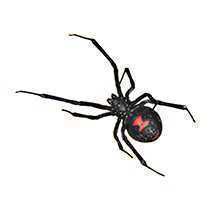(by the kind permission of National Pest Management Association)

Lactrodectus mactans
Description
Color: Black, with characteristic red "hourglass" on back
Legs: 8
Shape: Round
Size: 3/4" length; 3/8" in diameter
Antennae: False
Black widow spiders are most recognized for the red hourglass shape under their abdomen. Contrary to legend, female black widow spiders rarely devour the male black widow spider after mating.
Habits
Black widow spiders spin their webs near ground level. They often build their webs in protected areas, such as in boxes and in firewood.
Habitat
Black widow spiders are often found around wood piles and gain entry into a structure when firewood is carried into a building. They are also found under eaves, in boxes, and other areas where they are undisturbed.
Threats
The venom of a black widow spider is a neurotoxin and is used as a defense. Black widow spiders do not bite humans instinctively. The black widow spider bite can cause severe pain. Young children and the elderly are especially susceptible to a severe reaction to a black widow spider bite.
Prevention
Avoid black widow spider bites by wearing heavy gloves when moving items that have been stored for a long period of time. Spiders often hide in shoes, so check shoes and shake them out before wearing. When spider webs are visible, use caution before putting your hands or feet in that area.


